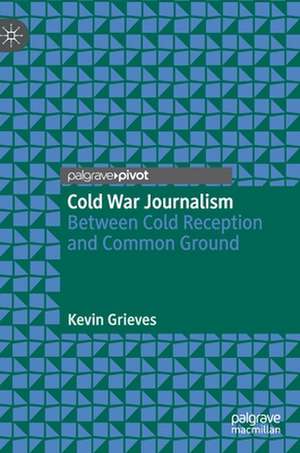Cold War Journalism: Between Cold Reception and Common Ground
Autor Kevin Grievesen Limba Engleză Hardback – 30 apr 2021
Preț: 450.71 lei
Nou
Puncte Express: 676
Preț estimativ în valută:
86.24€ • 93.97$ • 72.67£
86.24€ • 93.97$ • 72.67£
Carte tipărită la comandă
Livrare economică 23 aprilie-07 mai
Preluare comenzi: 021 569.72.76
Specificații
ISBN-13: 9783030656393
ISBN-10: 303065639X
Pagini: 134
Ilustrații: VII, 134 p.
Dimensiuni: 148 x 210 mm
Greutate: 0.33 kg
Ediția:1st ed. 2021
Editura: Springer International Publishing
Colecția Palgrave Macmillan
Locul publicării:Cham, Switzerland
ISBN-10: 303065639X
Pagini: 134
Ilustrații: VII, 134 p.
Dimensiuni: 148 x 210 mm
Greutate: 0.33 kg
Ediția:1st ed. 2021
Editura: Springer International Publishing
Colecția Palgrave Macmillan
Locul publicării:Cham, Switzerland
Cuprins
1. Introduction.- 2. Cold War Journalists as the 'Enemy'.- 3. Cold War Journalism as Threat: Shielding Against Foreign Media Content.- 4.Cold War Journalism as Utility: Leveraging Foreign Media Content.- 5. Celebrating Transnational Connections.- 6. Questioning Journalistic Common Ground.- 7. Conclusion.
Notă biografică
Kevin Grieves is Associate Professor in the Department of Communication Studies at Whitworth University, USA. He is author of Journalism Across Boundaries: The Promises and Challenges of Transnational and Transborder Journalism (Palgrave Macmillan, 2012). He has published a number of scholarly articles on Cold War journalism history.
Textul de pe ultima copertă
This book explores Cold War journalism and journalists as threat, representing ‘enemy’ systems and ideologies. The book also examines Cold War aspirations of forging transnational journalistic connections across the Iron Curtain as well as finding common journalistic ground within the East and West blocs. The book shines a critical light on overly idealistic visions for that journalistic common ground, drawing on primary archival source material to investigate journalists and reporting work, journalistic content and journalistic venues during the Cold War era. This is not a book about traditional war correspondence – rather, it is about the rhetorical battles and the ideological fronts that have shaped and continue to shape our world. By fully understanding how journalism and journalists have intersected with hostile barriers and divisions in the past, we can have a more nuanced understanding of the current global media environment.
Caracteristici
Addresses an important need to help readers better navigate the growing chasms between different understandings of journalism Explores the rhetorical battles and the ideological fronts that have shaped and continue to shape our world, to give a more nuanced understanding of the current polarized political and media climates Accomplishes a unique examination of historical context by way of several distinct case studies that contain common threads
